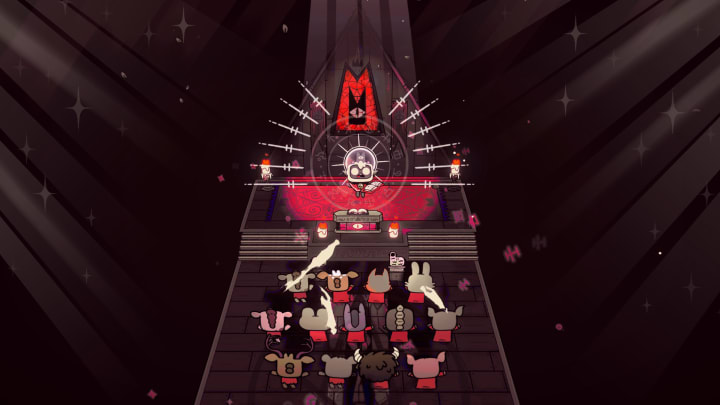Preach the Woolly Gospel in Cult of the Lamb

As I watched a poor, unimposing lamb lie on a sacrificial altar, surrounded by monstrous beings and ready to meet its maker, I wondered what sort of game I had just strapped myself in for. The on-screen action was sinister and unsettling, but every depicted character was unbearably cute. I felt conflicted, and a bit bemused. I quickly learned that this was devilishly intentional.
Cult of the Lamb takes your calming villager sim and fills it with dark worship and disturbing rituals, adding a healthy dose of challenging roguelike combat on top. The game is essentially a two-for-one: it offers procedurally generated dungeon crawling with randomized weapons and buffs, then marries it to resource management gameplay in which players must build and grow their own cult.
That cult begins with the lamb. Now saved from its demise by a mysterious (and ominous) being, it is indebted to its savior and instructed to build a following of worshippers and cleanse the world of non-believers. As the lamb, it is the player’s job to roam the wilds, save various woodland creatures from rival cult sacrifices, and indoctrinate them into the titular cult.
Granted this lamb is a compelling cult leader; within minutes of starting I realized that I, too, would be willing to lay down my life for this adorable creature. Its design, its run cycle, even its idle animation — all seem perfectly crafted to contrast the game’s twisted subject matter.
Once players begin their cult-crafting journey, they soon stumble across their first potential recruit about to be killed. Another adorable but defenseless woodland creature lies on an altar, and the game prompts a rescue of the victim through one of the first bouts of combat. Simple, fast-paced slashing attacks and quick dodge rolls are the abilities at hand for this battle, but a deeper pool of combat abilities opens up later on.
Defeating the rival cult members saves the captured creature, who is then magically ported away to the cult’s new base. At first, it’s not much to look at: a large field, filled with rocks, logs, and overgrown foliage. Thankfully you don’t have to clear the whole thing up yourself. Instead, you can put your new worshiper straight to work cutting up wood or mining rocks. You'll need these resources to build additional structures within your camp. After all, as the cult grows, so do the needs of the following. You’ll need to cook them food, clean up their disgraces (they’re animals, after all), and ensure they maintain enough faith in your cause. Without a cooking station, they'll starve. Without a temple, they’ll have nowhere to pray. Failure to provide beds will only guarantee grumpy and ill-stricken followers with a higher risk of falling into an early grave — something else you’ll need to build. And if their morale drops too low, they may simply desert. It's like if a Tamagotchi had a hardmode.
The game offers a fair amount of autonomy when it comes to placing these structures, allowing players to shape the camp how they like. Another fun, if somewhat heinous, set of customization features is that of the followers themselves. As part of their indoctrination, you get to transform the appearance of your new worshiper. Alter their color, or change their species altogether. If you want your cult to be solely comprised of light-blue deer, so be it. (There’s something unsettling and typical about a homogenized cult lacking in individuality or self-governance, isn’t there?)
Cults, I imagine, work best with abundant followers. So with that, it’s back out to the wilderness to rescue some more. Here, the game’s roguelike combat sets it apart from your average life sim. Every path offers its own challenge, and you never quite know what your odds of survival will be. While that might seem worrisome, each run through a level provides valuable resources, even if you die on the way. Money, food, materials, followers, even gifts for your existing devotees can be obtained from a single venture into the deadly wilds. All of this you’ll take back to your cult and use to grow stronger. Happy, well-cared for followers generate Faith and Devotion, resources which are used to level up your cult, unlock further facilities and improve your survival on the next run.
Cult of the Lamb feels sure of itself. Even in its smallest moments, the game’s theme and direction carry across, strongly melding the cartoon with the occult. In a flash the scene can turn from peaceful to horrific, even as it remains undeniably cutesy. The gameplay is compelling, if deceptively challenging. You’ll need to be prepared to die a lot, but as in any good roguelike death isn’t a barrier; collect yourself, grow and try again. Repeating areas doesn’t feel like a chore thanks to the procedurally generated dungeon, and each turn has the potential to surprise you with strange encounters or monstrous weapons.
As for how deep the gameplay goes, it’s hard to say. I only got to experience a few hours of Cult of the Lamb’s preview state. But through this quick glance it seems that the game has plenty more to offer — further dungeons and skill branches that remain locked, and various enemies and boss fights I’ve yet to fall to. I can’t say I’ve ever been interested in cults, nor did I think I’d be susceptible to cultish behavior. But if you were to hand me a pamphlet in the street for a "Cult of the Lamb," I’d at least give you the time of day.
Cult of the Lamb is set to release Aug. 11, heading to PlayStation, Xbox, Nintendo Switch, and Steam.